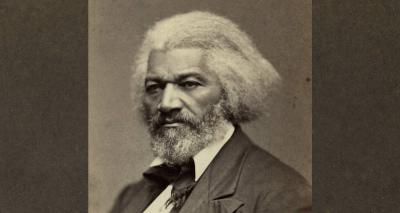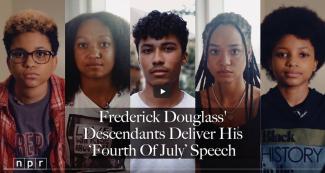A Day of Hope

Photo by George K. Warren ca. 1879, Frank W. Legg Collection, National Archives, NAID: 558770
Frederick Douglass
“The Fourth of July – also known as Independence Day or July 4th – has been a federal holiday in the United States since 1941, but the tradition of Independence Day celebrations goes back to the 18th century and the American Revolution. On July 2nd, 1776, the Continental Congress voted in favor of independence, and two days later delegates from the 13 colonies adopted the Declaration of Independence, a historic document drafted by Thomas Jefferson. From 1776 to the present day, July 4th has been celebrated as the birth of American independence, with festivities ranging from fireworks, parades and concerts to more casual family gatherings and barbecues.”
~ from “Fourth of July – Independence Day” on the “History” website
Recently I was part of a conversation about why many Black people don’t celebrate Independence Day or why they choose to celebrate July 5th instead. To some, the celebration on the 4th is a reminder of the hypocrisy embodied in the occasion as it relates to freedom and justice for all.
That view was held by Frederick Douglass, a former slave who escaped to freedom. He became one of the leading abolitionist voices in the nineteenth century. In June 1852, he delivered the speech “What to the Slave is the Fourth of July?” to the Ladies’ Anti-Slavery Society of Rochester, New York. He was invited to give his speech on July 4, 1852, in recognition of the 76th anniversary of the Declaration of Independence, but chose to give it on July 5th to highlight the fact that Independence Day was not a day of celebration for enslaved people.
The words from the Declaration of Independence – “We hold these truths to be self-evident, that all men are created equal, that they are endowed by their Creator with certain unalienable Rights, that among these are Life, Liberty and the pursuit of Happiness” – stand as unfulfilled proclamations to those who still feel the pressures of oppression based on being born Black.
I challenged my colleagues to read the entire 10,426 word speech to grasp a deeper meaning from his words spoken over 170 years ago, and to remember we are not slaves. Douglass was a great orator! He praised and chastised throughout the oration. He offered a critical analysis of both the Declaration of Independence and the Constitution, pointing out the inconsistencies between the lofty words and the actions of the nation.
“... let me ask, if it be not somewhat singular that, if the Constitution were intended to be, by its framers and adopters, a slave-holding instrument, why neither slavery, slaveholding, nor slave can anywhere be found in it.”
“Fellow-citizens! there is no matter in respect to which, the people of the North have allowed themselves to be so ruinously imposed upon, as that of the pro-slavery character of the Constitution. In that instrument I hold there is neither warrant, license, nor sanction of the hateful thing; but interpreted, as it ought to be interpreted, the Constitution is a GLORIOUS LIBERTY DOCUMENT. Read its preamble, consider its purposes. Is slavery among them? Is it at the gateway? or is it in the temple? it is neither.”
Douglass ended his speech with words of hope.
“Allow me to say, in conclusion, notwithstanding the dark picture I have this day presented, of the state of the nation, I do not despair of this country. There are forces in operation, which must inevitably, work the downfall of slavery. "The arm of the Lord is not shortened," and the doom of slavery is certain. I, therefore, leave off where I began, with hope. While drawing encouragement from ‘the Declaration of Independence,’ the great principles it contains, and the genius of American Institutions, my spirit is also cheered by the obvious tendencies of the age.”
Frederick Douglass left us a legacy of honesty and hope. My belief in those facts is strengthened as I listened to excerpts from this famous speech read by some of his descendants:
- Alexa Anne Watson, great-great-great-grandchild;
- Douglass Washington Morris II, great-great-great-great-grandchild;
- Haley Rose Watson, great-great-great-grandchild;
- Isidore Dharma Douglass Skinner, great-great-great-great-grandchild; and
- Zoë Douglass Skinner, great-great-great-great-grandchild.
May the commitment of this generation of young people be a source of hope.
I leave you with Isidore’s closing comments:
“Somebody once said that pessimism is a tool of white oppression, and I think that's true. I think in many ways, we are still slaves to the notion that it will never get better. But I think that there is hope, and I think it's important that we celebrate Black joy and Black life and we remember that change is possible, change is probable and that there's hope.”
I do not want anyone to be discouraged about having fun on the Fourth of July. I find it enlightening to learn the context of what and why we celebrate the way we do. Before I go to a cookout this year, I will encourage my family and friends to share a taste of Douglass’ speech by watching his descendants read excerpts of “What to the Slave is the Fourth of July?” featured on NPR on July 4, 2022.
Happy Independence day!

